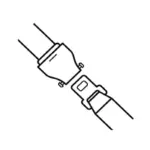
COVID-19 & AVIATION
Time to rethink!
Covid-19 demonstrated that aviation is a critical strategic infrastructure and service, providing essential connectivity, promoting socio-economic cohesion and timely supply of goods, thus serving our societies.
The professionals working in aviation – who provide a safe & dedicated service – are a crucial part of the aviation ecosystem: both before, during and after the crisis, and any potential recurrence thereof, and during the recovery – which is expected to be of unpredictable length.
This strategic inf rastructure, service and its people deserve priority attention. To do so, policy-makers and aviation stakeholders must use the crisis to rethink the ‘old’ system and to ‘repair’ its structural weaknesses and distortions that the crisis revealed – which, if unaddressed, will hinder the recovery, weaken the aviation sector, and harm the public interest.
To rethink the system and to make aviation resilient, sustainable and serving society as a whole, aviation professionals call for the following initiatives:

SOCIALLY SUSTAINABLE
THINK SOCIALLY SUSTAINABLE: Social responsibility must guide all aviation stakeholders during crises and recovery, and should be a ‘hard’ condition for providing public funding, bailouts and/ or regulatory relief measures. The principle of preserving jobs should guide decisions, incl. making full use of public support schemes, and any personnel-related measures must be agreed upon through genuine social dialogue.

ENVIRONMENTALLY SUSTAINABLE
THINK ENVIRONMENTALLY SUSTAINABLE: The recovery f rom this crisis must be used to put our sector on a growth path that is compatible with the goal of decarbonising aviation. New aircraft and aerospace technologies, alternative fuels, and emissions pricing & trading will play a key role. Adequate investments into Research & Development as well as industrial production facilities (e.g. for electro-fuels) must be made available and facilitated by national, regional and EU funds and private investors in an organized and coherent way.

TOTAL SYSTEM
THINK TOTAL SYSTEM: Aviation is a system where one part depends on the system’s other parts doing well, performing to standard and in a fair manner. To emerge f rom the crisis stronger, all parts need to support each other, rather than some players opportunistically (ab)using the crisis to push others to the wall, to weaken parts of the system, or to lower social standards in a race to the bottom. Aviation must be f inancially viable, but there is no automatic supremacy of e.g. airlines’ or airports’ shareholder value or ANSPs’ economic performance criteria over the public interest, over passengers and the professionals working in our industry.

REPAIR & REDESIGN
THINK REPAIR & REDESIGN: The crisis put the spotlight on numerous short-comings & distortions, which need to be addressed urgently, such as:
Vulnerability of ANSP funding
Whilst ATM/ANSPs being an essential part of the aviation infrastructure, the ANSP funding mechanisms & performance criteria have shown their limits during the crisis – and without change they will again during the next one. Hence, the current scheme, which works only in times of growing air traffic, must be fundamentally rethought & redesigned in order to build economic resilience of ATM/ANSPs during crisis situations, i.e. by building buffers for times when traffic is going down. Resilience (buffering) should be a standard element of the Key Performance Areas of all actors in the aviation infrastructure. In the meantime, public financial support is currently needed to ensure an efficient & safe service during the crisis and recovery, maintaining skills & professional staff.
Market distortions & social engineering
For too long, authorities turned a blind eye on certain air operators exploiting legal loopholes to engage in social engineering, atypical employment, outsourcing and regulatory forum shopping – thereby distorting competition to the disadvantage of those who do not make use of such (mal)practices. Governments as well as the European Commission need to step up their efforts to eliminate predatory & unfair behaviour and to ban precarious atypical employment forms and outsourcing.

SKILLS
THINK SKILLS: The performance and safety of aviation directly depends on the skills & competences of those working therein and their formal, legal recognition. Job-insecurity and wide-spread, lasting unemployment will entail a loss of skills, experience and recency, as well as a brain-drain as professionals seek employment in other sectors. To ensure the ability to recover f rom the crisis fast and safely, maintaining the human capital & skills base of aviation professionals will be crucial – and should be a guiding principle for any measures taken at company, national, European and international level.

SAFETY
THINK SAFETY: The crisis pushed our industry to the limits of its safety performance, by exacerbating existing hazards, creating new ones, and by allowing operations way outside established safety regulations. Loss of operational experience and recency is one area of concern. Aircraft airworthiness is another, due to cost cuts and lay-offs in maintenance organisations. At the same time the national authorities’ ability to carry out their safety oversight is weakened. While the economic need for a swift recovery is evident, re-establishing pre-crisis safety standards and levels quickly – and further improving them – must be a priority. If in doubt, safety must always override commercial considerations. Personnel skills and experience are a key prerequisite for Safety.

REFOCUS
THINK REFOCUS: A ‘smart & digital’ recovery is what everybody talks about. However, smart & digital cannot become synonymous with simply designing the human out of the equation and/or pursuing some ‘pet projects’ promoted by certain players, without ensuring an equivalent level of safety and without considering social implications. Particularly in times of crisis & recovery, priority must be given to getting back to a safe and functioning system, rather than pushing forward concepts like Remote Towers, Single Person Operations in ATM, Reduced Crew Operations, Crew Interoperability/ Group Operations (which should be halted). Instead, a re-focus is needed on addressing the rise of atypical employment forms, systematic ANSP f ragmentation and outsourcing, ATM inf rastructure & f inancing, maintaining skills, etc.

EUROPE
THINK EUROPE: Our aviation inf rastructure will only come out of the crisis unharmed – and possibly stronger – if decision-makers promote a level playing f ield and think in terms of a resilient European aviation transport network. This means wider use of Public Service Operations, it means defending airlines within the same regulatory system against subsidised competitors f rom 3rd countries, limiting the market access to certain traff ic rights and limiting 3rd country wet-leasing, ANSP f ragmentation or unbundling, as well as maintaining & enforcing Ownership & Control rules, rather than loosening them and liberalising even further access to the European market.